25+ Sample Non Profit Articles of Incorporation
-
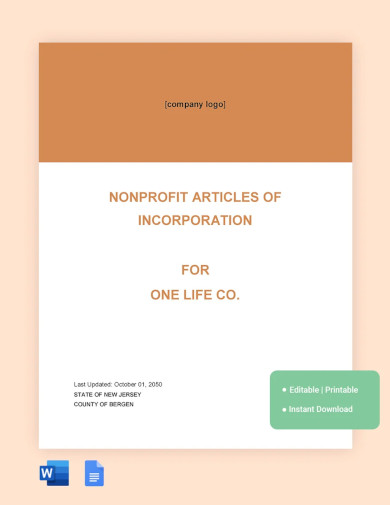
Nonprofit Articles Of Incorporation
download now -

Articles of Incorporation for a non Profit Organisation
download now -
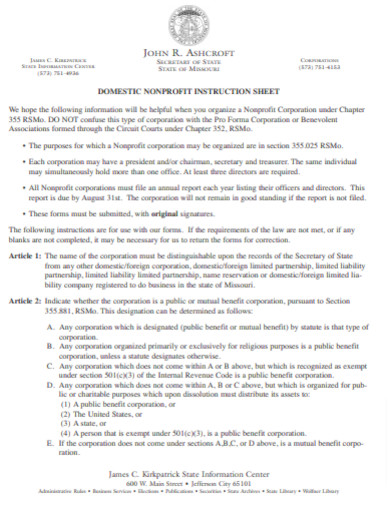
Nonprofit Business Articles Of Incorporation
download now -
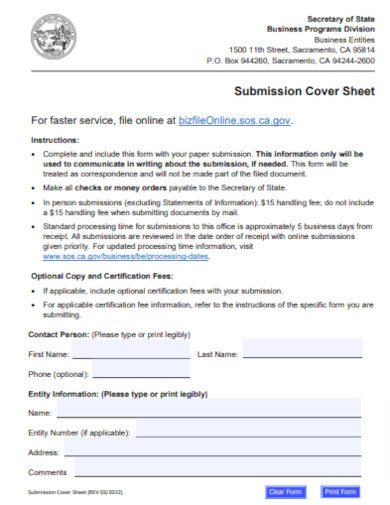
Nonprofit California Articles Of Incorporation
download now -
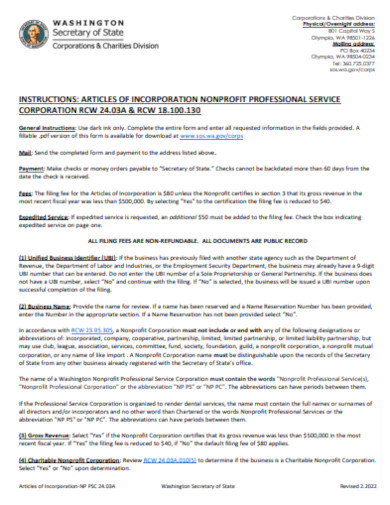
Nonprofit Washington Articles Of Incorporation
download now -
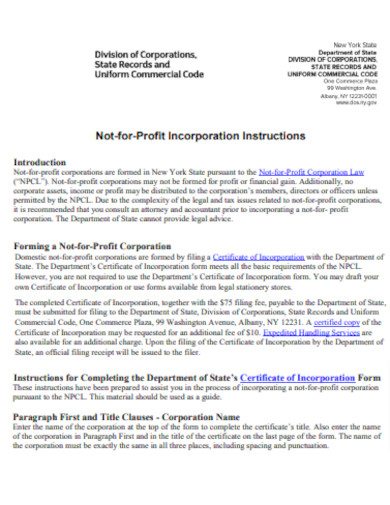
Nonprofit Newyork Articles Of Incorporation
download now -
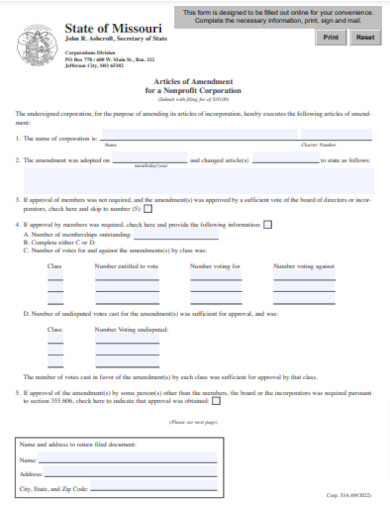
Nonprofit Amendment Articles Of Incorporation
download now -
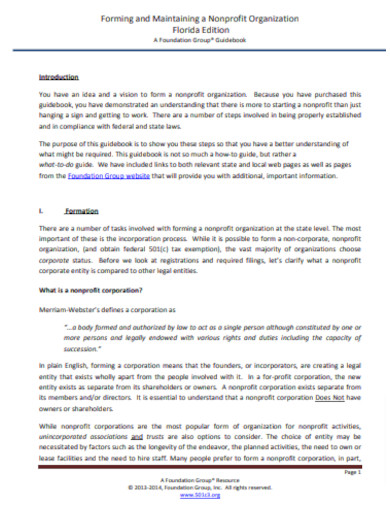
Nonprofit Florida Articles Of Incorporation
download now -
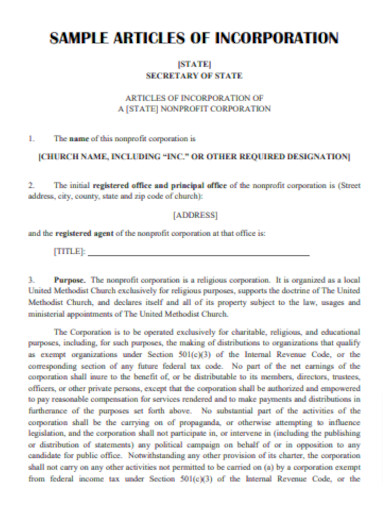
Nonprofit Religious Articles Of Incorporation
download now -
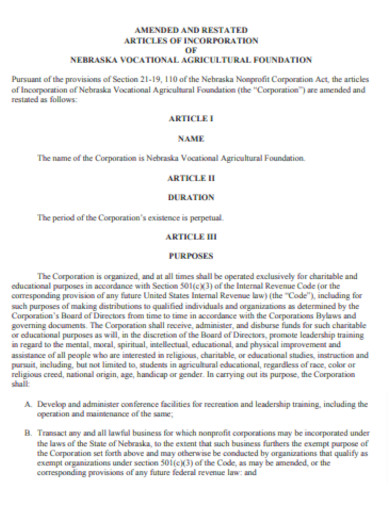
Nonprofit Nebraska Articles Of Incorporation
download now -
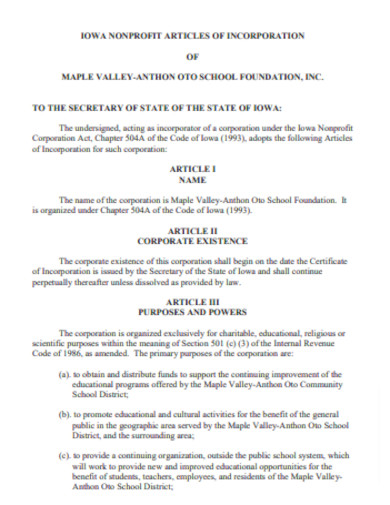
Nonprofit IOWA Articles Of Incorporation
download now -
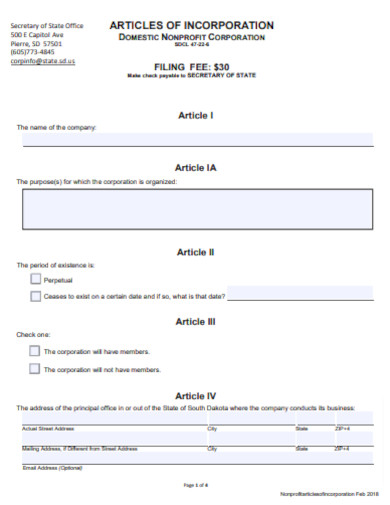
Nonprofit Domestic Articles Of Incorporation
download now -
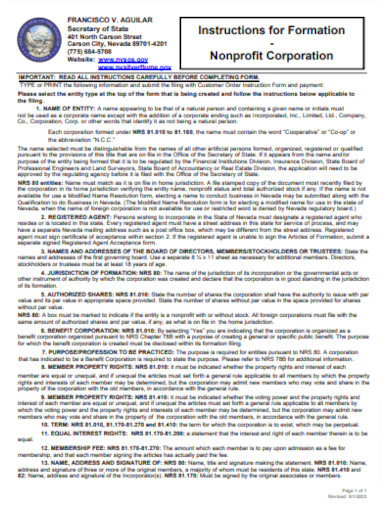
Nonprofit Formation Articles Of Incorporation
download now -
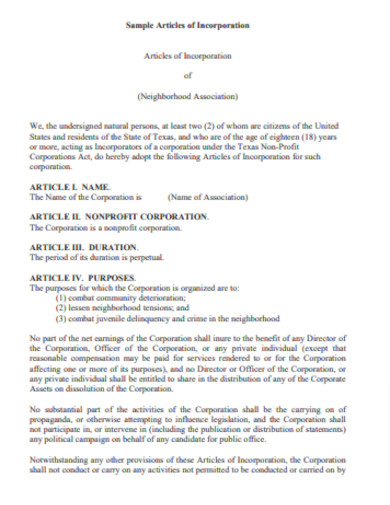
Sample Nonprofit Articles Of Incorporation
download now -

Basic Nonprofit Articles Of Incorporation
download now -
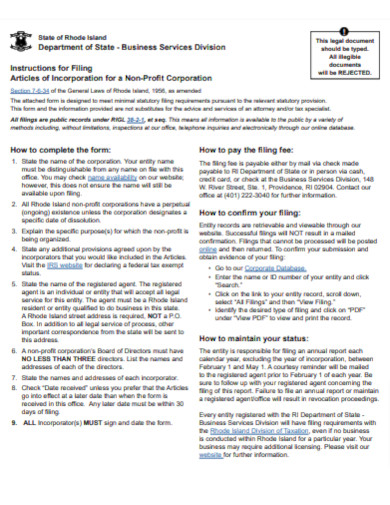
Nonprofit Articles Of Incorporation Outline
download now -
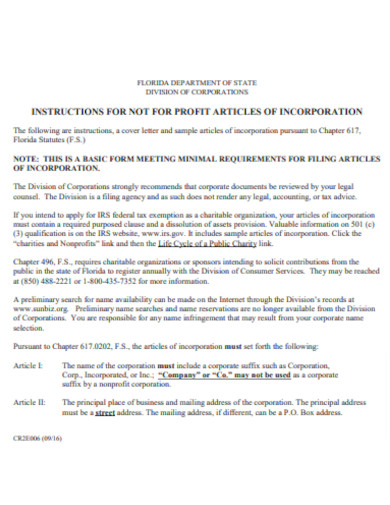
Printable Nonprofit Articles Of Incorporation
download now -
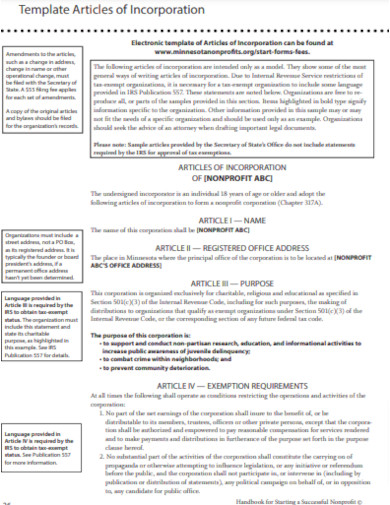
Nonprofit Articles Of Incorporation Layout
download now -
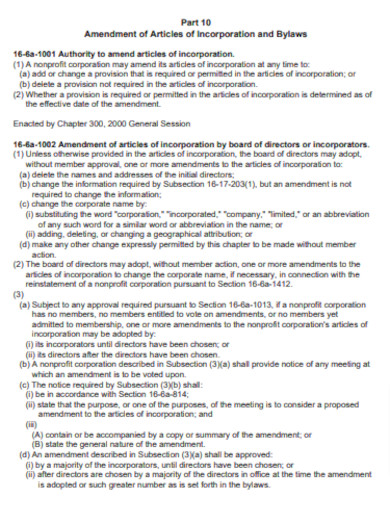
Nonprofit Bylaws Articles Of Incorporation
download now -
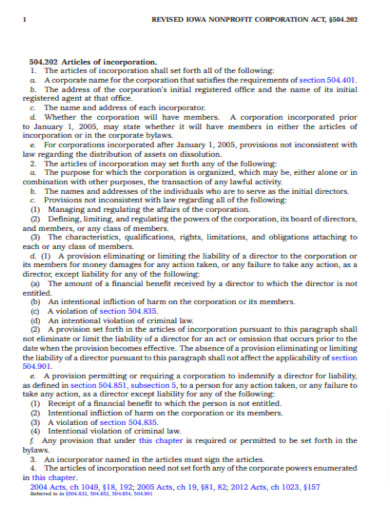
Editable Nonprofit Articles Of Incorporation
download now -

Nonprofit Articles Of Incorporation Format
download now -
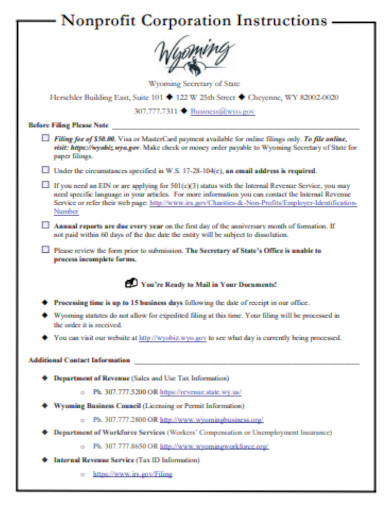
Nonprofit Articles Of Incorporation Instruction
download now -
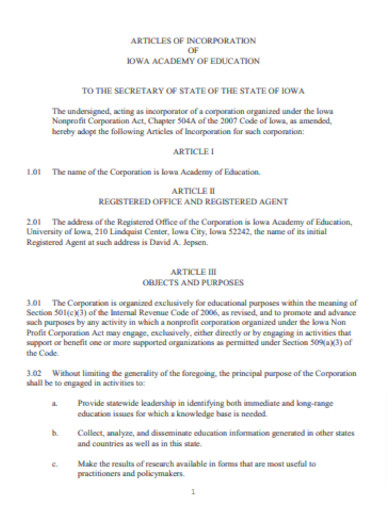
Nonprofit Articles Of Incorporation in PDF
download now -
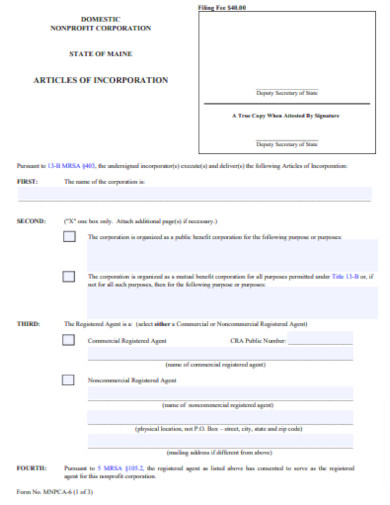
Nonprofit Articles Of Incorporation Form
download now -
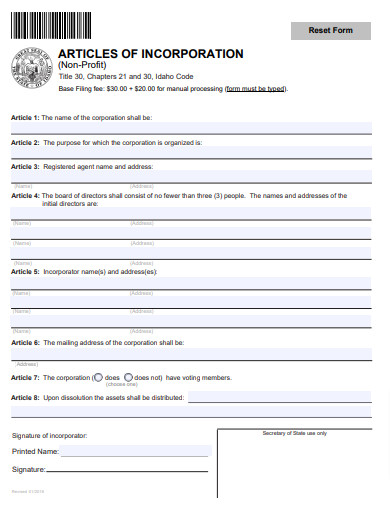
Standard Nonprofit Articles Of Incorporation
download now -
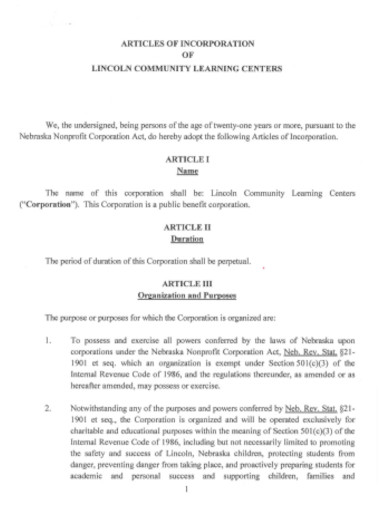
Nonprofit Community Articles Of Incorporation
download now
FREE Non Profit Articles of Incorporation s to Download
25+ Sample Non Profit Articles of Incorporation
Definition
Importance in the Formation of a Non-profit Organization
Historical Context
The Fundamental Elements
Key Provisions to Include
Distinct Features of Non-profit Articles
State-Specific Considerations
Drafting Process
Amendments and Revisions
Operational Aspects
FAQ’S
How do they differ from for-profit Articles of Incorporation?
How do Articles of Incorporation relate to bylaws?
What costs are associated with filing the Articles of Incorporation?
Can a non-profit operate without formal incorporation?
How often should the Articles be reviewed?
Definition
The Non-profit Articles of Incorporation serve as a crucial document that officially signifies the establishment of a non-profit organization. They act as a written testimony to the organization’s fundamental purpose, structure, and mode of operation.
Importance in the Formation of a Non-profit Organization
Beyond mere documentation, these Articles play a crucial role in offering legitimacy, guiding operational plan, and ensuring compliance with the legal requirements of the jurisdiction in question.
Historical Context
Origin and Evolution of Non-profit Entities
Tracing back to ancient civilizations, non-profit entities have always existed, albeit under varied nomenclatures. It was in the Renaissance era that formal structuring began, laying the foundation for modern-day non-profit incorporations.
Importance of Formal Incorporation
In today’s labyrinth of legal complexities, formal incorporation isn’t merely a bureaucratic formality. It acts as a shield, ensuring that the organization’s charitable mission is untainted and insulated from unforeseen legal quandaries.
The Fundamental Elements
Name of the Organization
A non-profit’s name isn’t just an identifier; it encapsulates its ethos. While selecting a moniker, ensure it’s both reflective of the mission and compliant with state-specific naming conventions.
Purpose Statement
Arguably the core of the Articles, the purpose statement clarifies the reason for existence of the entity. A well-crafted statement not only aligns internal stakeholders but also fosters external trust.
Duration
While many non-profits opt for perpetual existence, specifying duration can be vital, especially if the organization’s mission is time-bound or project-specific.
Key Provisions to Include
Registered Agent Information
Vital for official communication, the registered agent acts as the organization’s legal point of contact, necessitating accurate and current details.
Membership Details
Outlining membership criteria, rights, and processes ensures democratic functioning and stakeholder inclusivity.
Principal Office Address
Beyond mere location, the principal office is the epicenter of operations, governance, and strategic deliberations.
Distinct Features of Non-profit Articles
Absence of Shareholders
Distinct from their for-profit counterparts, non-profits eschew shareholders, emphasizing mission over monetary dividends.
Tax-exempt Status
Qualified non-profits enjoy tax exemptions, contingent on adherence to specific operational modalities and mission fidelity.
Charitable Purpose Orientation
An intrinsic characteristic, non-profits prioritize societal impact and altruism, as enshrined in their Articles.
State-Specific Considerations
Variations in Regulatory Requirements
Each jurisdiction offers a unique regulatory cocktail, necessitating meticulous research and adherence to local stipulations.
Understanding Local Precedence
Beyond codified laws, understanding local judicial interpretations and precedents can provide invaluable insights during the incorporation process.
Drafting Process
Preliminary Research
Embarking on the drafting journey necessitates comprehensive groundwork, encompassing legal mandates, best practices, and sector-specific nuances.
Engagement of Legal Counsel
Navigating the intricate legal maze warrants expertise. Engaging legal counsel can preempt potential pitfalls and ensure document robustness.
Document Review and Iterations
Iterative reviews, both internal and with legal experts, hone the document, ensuring alignment with strategic intents and legal mandates.
Amendments and Revisions
When and Why Revisions are Necessary
The dynamic nature of non-profits, coupled with evolving external environments, may necessitate document amendments.
The Amendment Procedure
A structured approach to amendments ensures legal compliance and stakeholder consensus, preserving the organization’s mission integrity.
Operational Aspects
Bylaws versus Articles of Incorporation
While both are cardinal, distinguishing between bylaws (operational directives) and Articles (foundational charter) is quintessential for seamless governance.
Ensuring Compliance with Regulatory Framework
Post-incorporation, adherence to the Articles and jurisdictional mandates ensures operational longevity and legal insulation.
FAQ’S
How do they differ from for-profit Articles of Incorporation?
While both serve as founding documents, non-profit articles typically focus on the organization’s charitable, educational, or religious mission, whereas for-profit articles emphasize profit generation and distribution to shareholders.
How do Articles of Incorporation relate to bylaws?
While the Articles of Incorporation establish and define the non-profit’s existence, the non profit bylaws outline the organization’s operational rules, procedures, and governance structures.
What costs are associated with filing the Articles of Incorporation?
Filing fees differ by state. Some states also have additional fees for expedited services or specific certifications.
Can a non-profit operate without formal incorporation?
While a group can function as a non-profit without incorporation, formalizing through incorporation provides legal protection, credibility, and often is a prerequisite for grant applications and tax-exempt status.
How often should the Articles be reviewed?
It is advisable to periodically review the Articles, especially when there are significant organizational changes. This guarantees ongoing compliance with state regulations and alignment with the evolving goals of the non-profit.
The Non-profit Articles of Incorporation, being a fundamental document, impact every aspect of the organization’s journey. Their careful creation, regular evaluation, and adherence ensure that the non-profit remains a symbol of societal influence, legally strong and mission-focused. As non-profits navigate the constantly changing socio-legal environment, these Articles act as both a guiding light and a stabilizing force, directing and grounding their selfless pursuits.
